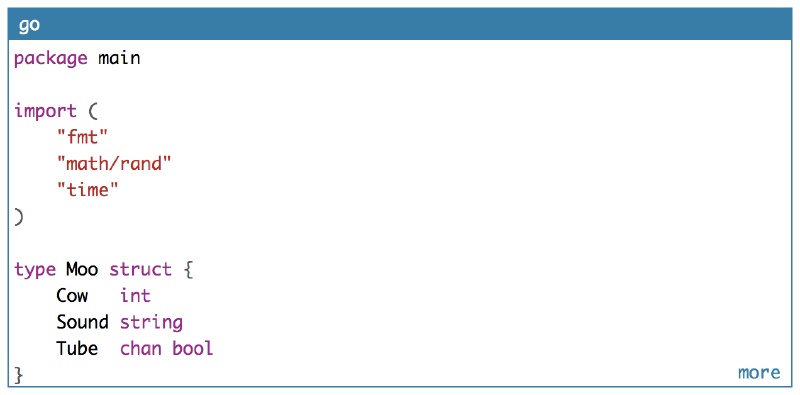How to keep blog posts with large code blocks readable?
Updated:
4 minutes

Syntax highlighting with highlight.js is great! But if you want to give your readers working code, the code blocks can get really big. Big code blocks mess up reading flow.
You don’t want that, now do you? 😔
View more, view less
A solution is to make the code blocks collapsible. By default a code block that is longer than a given number of lines will be truncated and a “more” link is added.
When you click the more link, the code block folds open to reveal the entire code. A “less” link provides you a way to collapse the code block again when you’re ready to read on.
You can find a little live demonstration right below.
A first code block.
package main
import (
"fmt"
"math/rand"
"time"
)
type Moo struct {
Cow int
Sound string
Tube chan bool
}
// A cow will moo until it is being milked
func cow(num int, mootube chan Moo) {
tube := make(chan bool)
for {
select {
case mootube <- Moo{num, "moo", tube}:
fmt.Println("Cow number", num, "mooed through the mootube")
<-tube
fmt.Println("Cow number", num, "is being milked and stops mooing")
mootube <- Moo{num, "mooh", nil}
fmt.Println("Cow number", num, "moos one last time in relief")
return
default:
fmt.Println("Cow number", num, "mooed through the mootube and was ignored")
time.Sleep(time.Duration(rand.Int31n(1000)) * time.Millisecond)
}
}
}
// The farmer wants to turn on all the milktubes to stop the mooing
func farmer(numcows int, mootube chan Moo, farmertube chan string) {
fmt.Println("Farmer starts listening to the mootube")
for unrelievedCows := numcows; unrelievedCows > 0; {
moo := <-mootube
if moo.Sound == "mooh" {
fmt.Println("Farmer heard a moo of relief from cow number", moo.Cow)
unrelievedCows--
} else {
fmt.Println("Farmer heard a", moo.Sound, "from cow number", moo.Cow)
time.Sleep(2e9)
fmt.Println("Farmer starts the milking machine on cow number", moo.Cow)
moo.Tube <- true
}
}
fmt.Println("Farmer doesn't hear a single moo anymore. All done!")
farmertube <- "yey!"
}
// The farm starts out with mooing cows that wants to be milked
func runFarm(numcows int) {
farmertube := make(chan string)
mootube := make(chan Moo)
for cownum := 0; cownum < numcows; cownum++ {
go cow(cownum, mootube)
}
go farmer(numcows, mootube, farmertube)
farmerSaid := <-farmertube
if farmerSaid == "yey!" {
fmt.Println("All cows are happy.")
}
}
func main() {
runFarm(4)
fmt.Println("done")
}A second code block.
package main
import (
"fmt"
"math/rand"
"time"
)
type Moo struct {
Cow int
Sound string
Tube chan bool
}
// A cow will moo until it is being milked
func cow(num int, mootube chan Moo) {
tube := make(chan bool)
for {
select {
case mootube <- Moo{num, "moo", tube}:
fmt.Println("Cow number", num, "mooed through the mootube")
<-tube
fmt.Println("Cow number", num, "is being milked and stops mooing")
mootube <- Moo{num, "mooh", nil}
fmt.Println("Cow number", num, "moos one last time in relief")
return
default:
fmt.Println("Cow number", num, "mooed through the mootube and was ignored")
time.Sleep(time.Duration(rand.Int31n(1000)) * time.Millisecond)
}
}
}
// The farmer wants to turn on all the milktubes to stop the mooing
func farmer(numcows int, mootube chan Moo, farmertube chan string) {
fmt.Println("Farmer starts listening to the mootube")
for unrelievedCows := numcows; unrelievedCows > 0; {
moo := <-mootube
if moo.Sound == "mooh" {
fmt.Println("Farmer heard a moo of relief from cow number", moo.Cow)
unrelievedCows--
} else {
fmt.Println("Farmer heard a", moo.Sound, "from cow number", moo.Cow)
time.Sleep(2e9)
fmt.Println("Farmer starts the milking machine on cow number", moo.Cow)
moo.Tube <- true
}
}
fmt.Println("Farmer doesn't hear a single moo anymore. All done!")
farmertube <- "yey!"
}
// The farm starts out with mooing cows that wants to be milked
func runFarm(numcows int) {
farmertube := make(chan string)
mootube := make(chan Moo)
for cownum := 0; cownum < numcows; cownum++ {
go cow(cownum, mootube)
}
go farmer(numcows, mootube, farmertube)
farmerSaid := <-farmertube
if farmerSaid == "yey!" {
fmt.Println("All cows are happy.")
}
}
func main() {
runFarm(4)
fmt.Println("done")
}How does it work?
The solution requires remarkably little tinkering. Just a little html wrapper, some css and some javascript. You can find the source code, including a Hugo shortcode on GitHub: Hugo collapsible code blocks.
Like my MacOS terminal CSS solution, this is designed to make technical blogging more readable and copy-paste friendly.
You might have noticed that when you collapse the code block, the page scrolls up. This is important, because it allows the reader to read on, right at the point where she clicked the “less” link.
Simple but effective, No!?